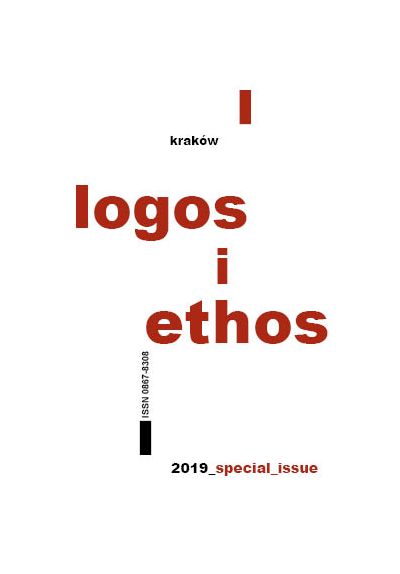Deformations of conscience
DOI:
https://doi.org/10.15633/lie.3471Keywords:
Dietrich von Hildebrand, pseudonorms, legalism, anarchism, extramoral theories, extramoral ideologies, moral values, extramoral values, value response, reverent humbleloving center, concupiscent center, pride centerAbstract
The paper presents a description of moral pseudonorms, which displace proper moral norms from our consciousness and action as well as distort our morality. The study analyzes mainly the pseudonorms that generate the fundamentals of legalism and their opposition – the fundamentals of moral anarchism. The first groups of pseudonorms identifies morality with civil law, especially criminal law. On the other hand the other group of pseudonorms, equates morality with what is spontaneous, impulsive, authentic.
The paper analyzes not only the scope and contentrelated distortion of moral norms caused by the substitutes of morality, but it also reveals the reasons of creating the pseudo norms in our consciousness. These reasons are induced by the impact of the pride center and the concupiscent center on our value response and by preferring the extramoral values over the moral ones. Exposing the mechanism of functioning of the pseudonorms in our moral consciousness is useful not only for ethics but also for psychology and pedagogy as well as for selfeducation and moral development.
References
Biesaga T., Dietricha von Hildebranda epistemologiczno‑ontologiczne podstawy etyki, Lublin 1989.
Biesaga T., Emocjonalna odpowiedź na wartość u podstaw życia moralnego, [in:] Konteksty podmiotowej świadomości, ed. E. Podrez, R. Moń, Olecko 2003 (Episteme, 29), pp. 91–100.
Biesaga T., Spór o normę moralności, Kraków 1998.
Biesaga T., Świadomościowe i osobowe warunki odpowiedzialności, [in:] O odpowiedzialności. Moralny wymiar odpowiedzialności w życiu publicznym, ed. J. Pawlica, Kraków 1993, pp. 67–74; and [in:] „Studia Philosophiae Christianae” 29 (1993) no. 2, pp. 27–37.
Dąbrowski K., Osobowość i jej kształtowanie poprzez dezintegrację pozytywną, Lublin 1984.
Fenomen sumienia, ed. D. Adamczyk, Kielce 2012.
Gorczyca J., Dietricha von Hildebranda koncepcja poznania wartości moralnych, „Analecta Cracoviensia” 19 (1987), pp. 427–439.
Hildebrand D. von, Christian Ethics, New York 1952; German Edition Ethik, Regensburg 1973 (Gesammelte Werke, 2).
Hildebrand D. von, Fundamentalne postawy moralne, trans. K. Meissner OSB, [in:] Wobec wartości, Kraków 1984, pp. 11–54.
Hildebrand D. von, Graven Images: Substitutes for True Morality, New York 1957; German Edition, Substitute für wahre Sittlichkeit, [in:] Idolkult und Gotteskult, Regensburg 1974, pp. 13–190 (Gesammelte Werke, 7).
Hildebrand D. von, Liturgie und Pesönlichkeit, [in:] Idolkult und Gotteskult, Regensburg 1974, pp. 191–300 (Gesammelte Werke, 7).
Hildebrand D. von, Przemienienie w Chrystusie, trans. J. Zychowicz, Kraków 1982.
Hildebrand D. von, Hildebrand A. von, The Art of Living, Chicago 1965.
Kurtek P., Lasota A., Wybrane psychologiczne aspekty struktury i rozwoju sumienia, [in:] Fenomen sumienia, ed. D. Adamczyk, Kielce 2012, pp. 53–70.
Murawski K., Jaźń i sumienie. Filozoficzne zagadnienia rozwoju duchowego człowieka w pracach Carla Gustawa Junga i Antoniego Kępińskiego, Wrocław 1987.
Stach R., Sumienie i mózg. O wewnętrznym regulatorze zachowań moralnych, Kraków 2012.
Wiśniewska D., Rodzaje i rola substytutów w moralności w ujęciu Dietricha von Hildebranda, „Logos i Ethos” 2014 no. 2 (37), pp. 77–98.
Downloads
Published
Issue
Section
License
Copyright (c) 2020 Tadeusz Biesaga

This work is licensed under a Creative Commons Attribution 4.0 International License.
Authors who publish with this journal agree to the following terms:
- Authors retain the copyright and full publishing rights without restrictions, and grant the journal right of first publication with the work simultaneously licensed under a Creative Commons Attribution 4.0 International License that allows others to share the work with an acknowledgement of the work's authorship and initial publication in this journal.
- Authors are able to enter into separate, additional contractual arrangements for the non-exclusive distribution of the journal's published version of the work (e.g., post it to an institutional repository or publish it in a book), with an acknowledgement of its initial publication in this journal.
- Authors are permitted and encouraged to post their work online (e.g., in institutional repositories or on their website) prior to and during the submission process, as it can lead to productive exchanges, as well as earlier and greater citation of published work (See The Effect of Open Access).

